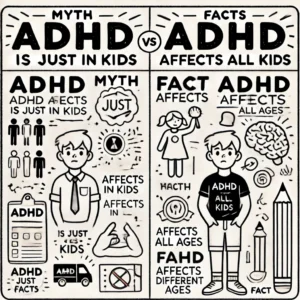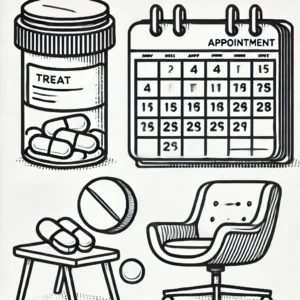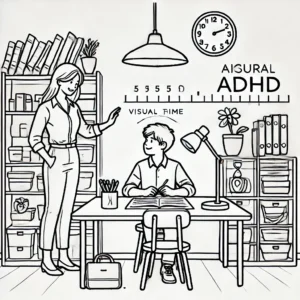Why Adult ADHD Diagnosis is Unique
ADHD, or Attention Deficit Hyperactivity Disorder, has historically been associated with children, leading to an under-recognition of the condition in adults. Many adults with ADHD may have shown symptoms in childhood that were either unrecognized or misattributed to behavioral issues, personality quirks, or other conditions. Adult ADHD can manifest through challenges with focus, organization, and time management, which are often mistaken for stress or personal limitations. However, with increased awareness and research, more adults are seeking assessments to understand whether ADHD might underlie these ongoing challenges.
Diagnostic Criteria: DSM-5 and ICD-10
Diagnosing ADHD in adults typically relies on the DSM-5 (Diagnostic and Statistical Manual of Mental Disorders) or the ICD-10 (International Classification of Diseases) criteria. These guidelines provide standardized criteria to assess the presence of ADHD symptoms, ensuring that a diagnosis is thorough and evidence-based.
- DSM-5 Criteria: The DSM-5 criteria focus on inattention, hyperactivity, and impulsivity. For adults, these symptoms must have been present before the age of 12 and must cause significant impairment in at least two settings (such as work, home, or social interactions).
- ICD-10 Criteria: The ICD-10, used internationally and by some UK clinicians, has slightly different diagnostic criteria. It focuses more broadly on hyperkinetic disorders but also addresses symptoms related to ADHD.
While the DSM-5 requires a minimum number of symptoms from both inattention and hyperactivity-impulsivity categories, the ICD-10 is often stricter, requiring more symptoms in the hyperactivity domain.
The Diagnostic Process for Adult ADHD
Diagnosing ADHD in adults involves multiple steps, usually conducted by a trained mental health professional, such as a psychiatrist, psychologist, or neuropsychologist. In the UK, assessments may be provided through the NHS, although private evaluations are also an option. Here’s an overview of the diagnostic process:
- Clinical Interview: The diagnostic process typically begins with an in-depth interview, where the clinician asks about the individual’s life history, focusing on behaviors and experiences that might indicate ADHD. Questions may explore areas like educational background, work history, relationships, and personal challenges.
- Self-Reported Symptoms: Self-assessment questionnaires, such as the Adult ADHD Self-Report Scale (ASRS), are often used to screen for ADHD symptoms. These standardized questionnaires allow individuals to reflect on how frequently they experience specific behaviors or challenges, like distractibility, forgetfulness, and difficulty completing tasks.
- Input from Family Members or Close Contacts: Gathering observations from family members, partners, or close friends can provide valuable insights, especially as ADHD symptoms are often more visible to others. This can help the clinician identify patterns or behaviors that the individual may overlook or downplay.
- Evaluating Co-Occurring Conditions: One of the challenges in diagnosing adult ADHD is that its symptoms can overlap with other mental health conditions, such as anxiety, depression, and bipolar disorder. For example, issues with focus and motivation can be present in both ADHD and depression, while impulsivity and restlessness might overlap with anxiety symptoms. A thorough evaluation is necessary to differentiate ADHD from these conditions, or to recognize when they co-occur.
Challenges in Diagnosing ADHD in Adults
Unlike children, adults with ADHD often have developed coping strategies that mask symptoms, which can make diagnosis more challenging. Additionally, symptoms in adults may present differently, with hyperactivity appearing as restlessness or an inability to relax, rather than overt physical activity.
The presence of co-occurring conditions, known as comorbidities, is also more common in adults. For instance, adults with ADHD often experience higher rates of mood disorders, substance use disorders, and learning disabilities. Clinicians must carefully assess the full spectrum of symptoms to ensure that the ADHD diagnosis is accurate and that treatment plans address all aspects of the individual’s mental health.
The Role of the Royal College of Psychiatrists and Other UK Resources
The Royal College of Psychiatrists in the UK provides valuable resources and guidelines for clinicians who are assessing ADHD in adults. The College emphasizes the importance of a comprehensive approach, where ADHD symptoms are considered within the context of the individual’s life experiences and any other mental health conditions. Additional UK resources, such as the ADHD Foundation and Mind UK, offer support and educational materials for adults considering an ADHD assessment.
Steps After Diagnosis
Once an adult is diagnosed with ADHD, they have various treatment and support options to consider:
- Medication: Stimulant medications, such as methylphenidate, are commonly prescribed and can help improve focus and reduce impulsivity. Non-stimulant medications may also be an option, depending on individual needs and medical history.
- Therapy: Cognitive-behavioral therapy (CBT) is often recommended to help individuals develop skills to manage ADHD symptoms. CBT for ADHD can focus on building routines, improving time management, and enhancing self-regulation.
- Support Groups: Support from organizations like ADHD Foundation and ADDISS can provide a community of individuals facing similar challenges, helping to reduce isolation and share strategies.
Seeking an ADHD Diagnosis: What to Expect
For adults in the UK considering an ADHD diagnosis, it’s important to consult with a qualified mental health professional who has experience with ADHD in adults. The process can be time-consuming, particularly with NHS waiting lists, but private assessments are available for those who may prefer a quicker diagnosis. After diagnosis, ongoing support from healthcare professionals and community resources can make a significant difference in managing ADHD symptoms and improving quality of life.
Key Takeaways
Diagnosing ADHD in adults is a nuanced process that involves understanding life-long patterns, differentiating symptoms from other mental health issues, and validating experiences through standardized criteria. Through comprehensive evaluation, adults with ADHD can gain clarity and access treatments that empower them to manage their symptoms effectively. The Royal College of Psychiatrists and other UK resources provide valuable guidance and support, making it easier for adults to navigate the path to diagnosis and beyond.









